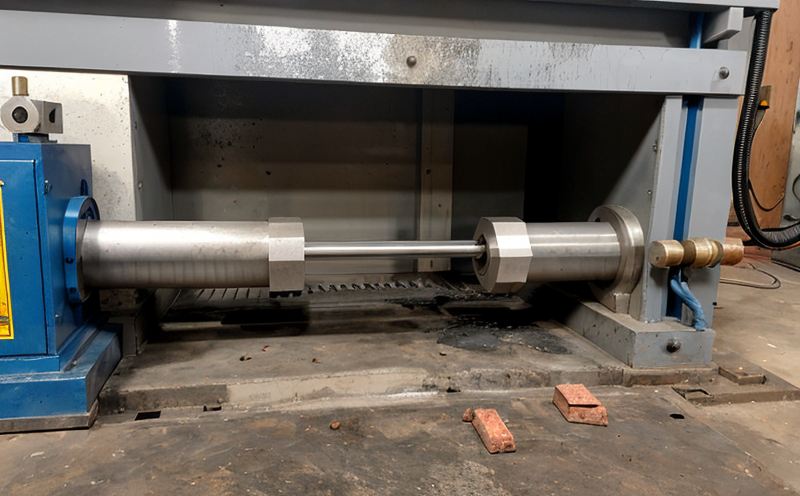ISO 306 Vicat Softening Temperature Testing Precision and Accuracy Evaluation Test
The ISO 306 Vicat Softening Temperature (VST) test is a standardized method used to determine the temperature at which a given material softens under load, typically in a specified environment. This information is critical for materials that undergo thermal or mechanical stress, such as thermoplastics and some elastomers.
The Vicat softening point is an empirical measure of a material's heat resistance and can be used to predict its performance under various operating conditions. The test involves placing the sample in a controlled environment, applying a standard load, and monitoring the temperature at which the material begins to soften or deform.
During this process, precision and accuracy are paramount to ensure reliable results. Variations in testing parameters such as heating rate, contact area between the sample and the needle, and environmental conditions can significantly affect the outcome. Therefore, it is crucial to follow the ISO 306 standard closely to minimize these variables.
The test is particularly useful for quality assurance and control in industries where material integrity under thermal stress is critical. For instance, in manufacturing sectors such as automotive, aerospace, and electronics, understanding a material's softening point can help prevent failures due to overheating or excessive deformation.
When conducting the ISO 306 Vicat Softening Temperature test, it is important to ensure that all testing equipment is calibrated correctly. This includes not only the heating system but also the precision measurement devices used to record temperature changes accurately.
The Vicat softening point can be influenced by various factors including molecular structure, additives, and processing conditions. Therefore, when interpreting the results of an ISO 306 test, it is essential to consider these variables alongside the reported temperature value.
Our laboratory specializes in providing precise and accurate ISO 306 Vicat Softening Temperature testing services. Using state-of-the-art equipment and adhering strictly to international standards, we ensure that each test delivers reliable results. Our experienced team of technicians can help you understand how these results impact your product's performance and durability.
Understanding the nuances of this test is key to optimizing material selection for your specific applications. By knowing exactly where a material begins to soften under load, you can design products that meet both functional requirements and safety standards effectively.
Applied Standards
| Standard Reference | Description |
|---|---|
| ISO 306:1985 | Method of determining the softening point under load for plastic materials by means of a Vicat apparatus. |
| ASTM D154-2017 | American Society for Testing and Materials standard method for determination of Vicat softening temperature of thermoplastic materials using a Vicat needle. |
| EN 389:1996 | European Standard for the determination of the softening point under load of plastic materials by means of a Vicat apparatus. |
The ISO 306 standard provides detailed guidelines on conducting the test, including specimen preparation, testing conditions, and data interpretation. Adherence to these standards ensures consistency across different laboratories worldwide, which is crucial for comparative studies and international trade.
Our laboratory uses only equipment that meets or exceeds the requirements specified in ISO 306. Regular calibration by certified personnel guarantees accurate measurements every time. This commitment to quality further enhances the precision and accuracy of our test results.
Benefits
The benefits of precise and accurate ISO 306 Vicat Softening Temperature testing extend beyond mere compliance with industry standards; they offer valuable insights into material behavior under thermal stress. Here are some key advantages:
- Enhanced Product Quality: Understanding the exact temperature at which a material softens allows for better control over manufacturing processes, ensuring that products meet stringent quality expectations.
- Better Design Decisions: Engineers can design more effective and durable components by leveraging accurate Vicat softening point data.
- Improved Safety: Knowing the critical temperature at which materials begin to soften helps prevent potential failures due to overheating or excessive deformation, thus enhancing overall safety.
- Economic Advantages: By optimizing material usage and reducing waste, businesses can achieve significant cost savings. Accurate testing also aids in selecting more efficient raw materials.
- Increased Reliability: Consistent test results contribute to higher product reliability, which is essential for maintaining customer satisfaction and trust.
The ISO 306 Vicat Softening Temperature test plays a vital role in ensuring that materials perform as expected under varying temperatures. This knowledge can be leveraged to improve process efficiency, reduce waste, and ultimately lead to more successful product launches.
Customer Impact and Satisfaction
Our ISO 306 Vicat Softening Temperature testing services have a direct impact on customer satisfaction by providing them with reliable data that supports informed decision-making. Here’s how:
Compliance Assurance: By ensuring that all tests adhere to the ISO 306 standard, we help our clients meet regulatory requirements and industry standards.
Informed Decision-Making: Accurate test results enable customers to make well-informed choices about material selection and product design. This leads to better-performing products that are more likely to succeed in the market.
Cost Efficiency: Our precision testing helps minimize material wastage, optimize production processes, and reduce overall costs for our clients.
Durability and Safety: By identifying materials that soften at appropriate temperatures, we contribute to the development of safer products. This is especially important in sectors like automotive and aerospace where product reliability is paramount.
Customer Satisfaction: The ability to trust our laboratory with critical testing ensures long-term relationships built on mutual respect and reliability.





